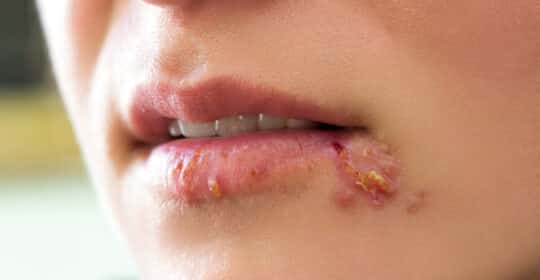
Cold Sores and Winter Seem to Go Hand in Hand
Whether you call them cold sores, oral herpes, or fever blisters, they are essentially the same thing. They seem to coincide with winter and they can be very painful and somewhat embarrassing.
What is a Cold Sore?
Cold sores are fluid-filled “fever” blisters that generally form on or around your lips. Occasionally they form inside your mouth and usually last for two to twelve days.
They are caused by the herpes simplex virus (HSV-1) which is not the same as the type 2 herpes that involves the genital area.
90 percent of all people get at least one cold sore in their life, and 40 percent of American adults have intermittent cold sores throughout the course of their lives.
What Causes a Cold Sore?
Cold sores can be triggered by several factors. Colds and flu are typical during the winter months, and either one of those illnesses can wake up a dormant cold sore. Once you have a cold sore, you have it for life. The virus that causes it can be dormant for years, but rise to the surface under the right circumstances. Some of those circumstances include:
- Extra stress
- Fatigue
- Varying winter weather conditions
- Colds or flu
- Weakened immune system
- Food allergies
Can I Prevent Cold Sore Outbreaks?
If you are prone to get cold sores you probably recognize when you are tired and run down, or sick that a cold sore will surface. Cold sores are very contagious and easily spread to others. Although you may not be able to prevent getting a cold sore, you can prevent spreading it to others in the following ways:
- Avoid kissing and other close contact with others.
- Don’t share food or drinks with others. That goes for utensils too.
- Make sure no one uses your towel or washcloth or anything that may come in contact with your cold sore.
Ways to Reduce the Risk of Getting a Cold Sore
Taking care of yourself during the winter months will help you avoid getting cold sores. Your diet has an impact on how often you get cold sores and a diet rich in lysine, an amino acid, is effective in keeping cold sores at bay. It is found naturally in proteins, but can also be taken as a supplement.
Proteins such as beef, chicken, turkey, fish, pork, eggs, yogurt, cheese, and soybeans all provide lysine in your diet, which aids calcium absorption and helps reduce cold sores. If you’re lacking enough lysine in your body, you may experience fatigue, agitation, nausea, anemia and a loss of appetite
- Avoid stress, get plenty of rest and stay hydrated.
- The winter sun is harsh. Make sure to use sunscreen and moisturizer on your lips.
- Frequent hand washing is a standard protection for many common illnesses. Cold sores are a virus, so wash your hands often and avoid touching your face.
There is no cure for a cold sore, but there are some antiviral over the counter medications such as Abreva, or prescription treatments such as Valtrex that will shorten the course of the outbreak.
Routine Dental Appointments
Since cold sores are mouth related, make sure you have regular appointments with Dr. Angela S. Evanson, DDS. She can take care of all of the oral and needs for your whole family.
Contact her by calling her Parker, Colorado office at (720) 409-0008 or make an appointment online.
This is the time of year to mix and mingle with family and friends. Do what you can to avoid getting a cold sore during this special time.
Leave a reply →





